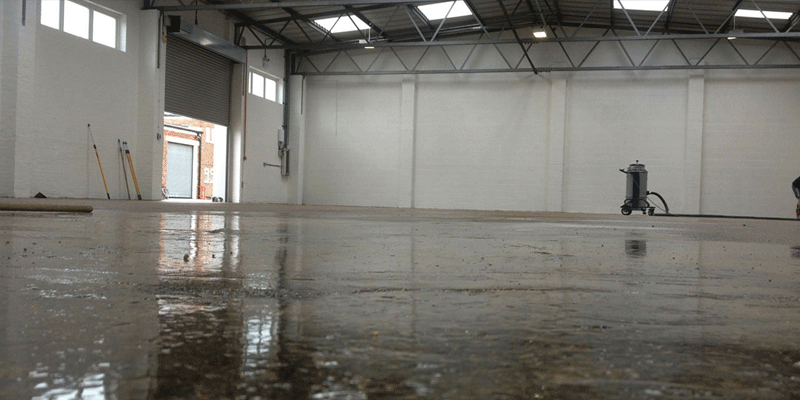How to Find the Best Floor Sealer

Are you struggling to find the best floor sealer? If so, you’re not alone. With so many products on the market, it can be tough to know which one is right for your needs. Many people put off installing a floor sealer due to the hassle and expense.
But there are benefits to having a floor sealer. In fact, there are many benefits. A floor sealer will protect your investment by keeping your floors looking new for years to come. It will also make cleaning easier and help to prevent stains.
This article will cover the basics of floor coating sealers before discussing how to find the best one for your needs.
Table of Contents
What is a Floor Sealer?
A floor sealer is a clear or tinted coating applied to concrete, ceramic tile, stone, brick, and other porous surfaces. The sealer penetrates the surface to create a barrier against water, oil, stains, and dirt.
There are two types of floor sealers: penetrating and film-forming. Penetrating sealers penetrate the surface to create an invisible barrier. Film-forming sealers form a thin protective layer on the surface.
Benefits of Using a Floor Sealer
There are many benefits to using a floor sealer. A floor sealer will protect your investment by keeping your floors looking new for years to come. It will also make cleaning easier and help to prevent stains.
A floor sealer will also increase the slip resistance of the surface. This is important for safety reasons, especially in areas with a lot of foot traffic.
How to Find the Best Floor Sealer
Now that you know the basics about floor sealers, it’s time to learn how to find the best one for your needs. There are a few things you’ll need to consider before making your purchase.
1. The type of floor you have
2. The amount of traffic your floor gets
3. Your budget
4. The appearance you want to achieve
5. The level of protection you need
Type of Floor
The first thing you’ll need to consider is the type of floor you have. Different types of floors will require different types of sealers. For example, a concrete floor will require a different sealer than a ceramic tile floor.
Amount of Traffic
The next thing you’ll need to consider is the amount of traffic your floor gets. If your floor gets a lot of foot traffic, you’ll need a sealer that can withstand a lot of wear and tear. On the other hand, if your floor doesn’t get much traffic, you won’t need an as durable sealer.
Budget
Your budget is another important consideration. There are many different types of floor sealers on the market, and they all vary in price. You’ll need to decide how much you’re willing to spend on a floor sealer before you start shopping.
Appearance
The appearance you want to achieve is also an important consideration. If you want a high-gloss finish, you’ll need to choose a different type of floor sealer than if you want a matte finish.
Protection
Finally, you’ll need to consider the level of protection you need. Some floor sealers provide more protection than others. If you’re looking for a sealer that will provide a high level of protection, you’ll need to choose a sealer that is designed for high-traffic areas.
The Importance of Professional Installation, Repairs, and Maintenance
Once you’ve chosen the best floor sealer for your needs, it’s important to have it installed by a professional. A professional will know how to apply the sealer properly and will make sure it is applied evenly.
A professional will also be able to repair any damage that has been done to your floors. And if you have any questions about maintaining your floors, a professional will be able to provide you with the answers you need.
The risk of not having a professional install, repair, or maintain your floors is that you could end up with a poor-quality sealer job. This could lead to premature wear, tear, and damage to your floors.
Hiring a professional to install, repair, or maintain your floors is an important investment that will protect your floors for years to come.
The Additional Risks of a DIY Floor Sealer
While it might be tempting to save money by doing a DIY floor sealer job, there are several risks associated with this approach.
The first risk is that you might not apply the sealer evenly. This can lead to an uneven finish and premature wear and tear.
The second risk is that you might not apply the right amount of sealer. If you don’t apply enough sealer, your floors won’t be properly protected. On the other hand, your floors could become slippery and dangerous if you apply too much sealer.
The third risk is that you might not choose the right type of sealer for your needs. If you don’t choose a durable enough sealer, your floors will likely be damaged prematurely.
Finally, if you’re not careful, you could end up damaging your floors while trying to apply the sealer. This could lead to costly repairs or even replacement.
As you can see, there are many risks associated with a DIY floor sealer job. For these reasons, it’s always best to hire a professional to install, repair, or maintain your floors.
Conclusion
Installing a floor sealer is a great way to protect your floors and make them easier to clean. But with so many products on the market, it can be tough to know which one is right for your needs. Use this guide to help you find the best floor sealer for your needs.
